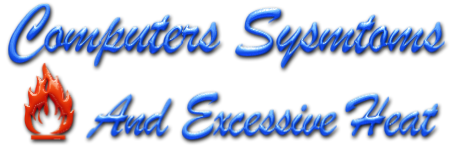Computers symptoms and causes of excessive heat.

Computer Overheating: Symptoms, Causes, and Prevention
Why Overheating is a Critical Issue
Computers generate heat as a natural byproduct of electronic components in operation. However, excessive heat can cause severe damage, reduce performance, and shorten the lifespan of your hardware. Proper cooling mechanisms, such as heat sinks and case fans, are essential for maintaining an optimal temperature.
In this guide, we’ll explore:
-
Symptoms of Overheating
-
Causes of Excessive Heat
-
Effective Cooling Solutions
Symptoms of Computer Overheating
Recognizing early warning signs can help prevent long-term damage. Common symptoms of excessive heat include:
✔ Frequent System Crashes & Freezing – The computer randomly shuts down or reboots.
✔ Slow Performance – High temperatures cause CPU throttling, slowing down processing speed.
✔ Loud Fan Noise – Cooling fans run at full speed constantly, trying to dissipate excess heat.
✔ Unexpected Shutdowns – The computer powers off without warning as a protective measure.
✔ Burning Smell or Hot Casing – Physical signs that components are overheating.
✔ Blue Screen Errors (BSODs) – Frequent errors due to overheating affecting the system’s stability.
Causes of Excessive Heat in Computers
Understanding what leads to overheating helps in preventing hardware failures. Here are the most common causes:
1. Poor Ventilation & Dust Accumulation
Computers require proper airflow to function efficiently. Blocked vents, dust buildup, and poor placement (such as keeping the PC inside a closed cabinet) can restrict airflow and trap heat.
🔹 Solution: Regularly clean dust from the system using compressed air and ensure proper ventilation around the computer.
2. Failing or Inadequate Cooling System
Components like heat sinks, thermal paste, and cooling fans help regulate temperature. If any of these fail or are improperly installed, the heat generated by the CPU and GPU cannot dissipate effectively.
🔹 Solution: Replace damaged cooling fans, reapply thermal paste, and ensure heat sinks are properly attached.
3. Overclocking the CPU or GPU
Overclocking pushes a processor beyond its designed speed, generating additional heat. While this may temporarily boost performance, it significantly increases thermal output and risks overheating.
🔹 Solution: Avoid overclocking unless you have an advanced cooling setup, such as liquid cooling or high-performance fans.
4. High Ambient Temperatures
Computers, like humans, have temperature tolerances. Extreme environmental conditions can cause overheating.
🔹 Solution: Keep your PC in a cool, well-ventilated area and avoid using it under direct sunlight or in hot rooms.
5. Malfunctioning Power Supply
A faulty power supply unit (PSU) can overheat, affecting overall system temperature.
🔹 Solution: Check if the PSU fan is running properly and replace it if necessary.
How to Prevent Overheating in Computers
Ensure Proper Airflow
-
Keep the computer elevated and away from walls.
-
Use cable management to prevent blockage inside the case.
-
Maintain a clean workspace, free from excessive dust.
Regular Maintenance
-
Clean fans, heat sinks, and vents every few months.
-
Replace thermal paste every 1–2 years to ensure optimal heat dissipation.
-
Check for loose or faulty cooling components.
Use Cooling Solutions
-
Invest in additional cooling fans or an aftermarket CPU cooler.
-
Consider liquid cooling for high-performance systems.
-
Keep your BIOS and fan control software updated for optimized cooling.
Final Thoughts
Overheating is a major issue that can damage your hardware, reduce performance, and cause unexpected shutdowns. By recognizing the symptoms early and following proper cooling and maintenance practices, you can prevent costly repairs and extend your computer’s lifespan.
Need Professional Help?
If your computer is overheating, contact us for expert computer repair and cooling solutions.
Call Us: (305) 600-4217
Professional Computer Repair | Cooling Solutions | Overheating Fixes



